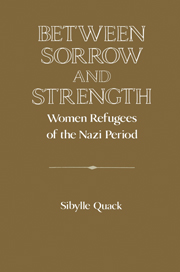Book contents
- Frontmatter
- Introduction
- Prologue: Jewish Women in Nazi Germany Before Emigration
- Part One A Global Search for Refuge
- 1 Jewish Women Exiled in France After 1933
- 2 Arrival at Camp de Gurs: An Eyewitness Report
- 3 Women Emigrés in England
- 4 England: An Eyewitness Report
- 5 Women Emigrés in Palestine: An Eyewitness Report
- 6 “Naturally, many things were strange but I could adapt”: Women Emigrés in the Netherlands
- 7 Refugee Women from Czechoslovakia in Canada: An Eyewitness Report
- 8 Women in the Shanghai Jewish Refugee Community
- 9 Shanghai: An Eyewitness Report
- 10 German-Jewish Women in Brazil: Autobiography as Cultural History
- 11 A Year in the Brazilian Interior: An Eyewitness Report
- Part Two Refuge in the United States
- Epilogue: The First Sex
- Index
10 - German-Jewish Women in Brazil: Autobiography as Cultural History
Published online by Cambridge University Press: 05 January 2013
- Frontmatter
- Introduction
- Prologue: Jewish Women in Nazi Germany Before Emigration
- Part One A Global Search for Refuge
- 1 Jewish Women Exiled in France After 1933
- 2 Arrival at Camp de Gurs: An Eyewitness Report
- 3 Women Emigrés in England
- 4 England: An Eyewitness Report
- 5 Women Emigrés in Palestine: An Eyewitness Report
- 6 “Naturally, many things were strange but I could adapt”: Women Emigrés in the Netherlands
- 7 Refugee Women from Czechoslovakia in Canada: An Eyewitness Report
- 8 Women in the Shanghai Jewish Refugee Community
- 9 Shanghai: An Eyewitness Report
- 10 German-Jewish Women in Brazil: Autobiography as Cultural History
- 11 A Year in the Brazilian Interior: An Eyewitness Report
- Part Two Refuge in the United States
- Epilogue: The First Sex
- Index
Summary
Many cultural historians are now taking a new look at the significance of gender in literature and history and at how extraordinary events affected ordinary people. The devastation of World War II that shaped transit, exile, Holocaust, and immigration changed the lives of all involved, but one cannot assume that these occurrences affected men and women in the same way. The cultural sphere for women has always been different from that of men, and this has always been true during the turning points of history. The unique way in which German-Jewish women recorded the major upheaval of the century adds perspective to our understanding of the era, specifically the South American exodus to Brazil.
Women's autobiographies describe and explore universal questions of exile and displacement. However, few studies have examined the methodology of such an undertaking. Autobiography as a primary source leads one to question the authenticity of “literature” as history. This is also a focus of the problem: Should autobiographies of this turbulent era be interpreted as literature, as history, or as both fact and fiction? How can one formulate a methodology for gender-based studies of exile and Holocaust memoirs? There is little precedent for a critical assessment of women's exile autobiography. Many critics tend to see autobiography as literature and are often uncomfortable discussing literature as history. More recent works such as Heinemann's Gender and Destiny and Young's Writing and Rewriting the Holocaust focus on the problems of interpretation regarding the Holocaust, but neither text focuses on exile.
- Type
- Chapter
- Information
- Between Sorrow and StrengthWomen Refugees of the Nazi Period, pp. 147 - 158Publisher: Cambridge University PressPrint publication year: 1995



